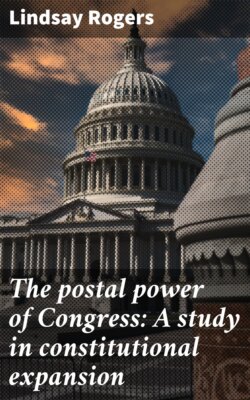Читать книгу The postal power of Congress: A study in constitutional expansion - Lindsay Rogers - Страница 7
На сайте Литреса книга снята с продажи.
ОглавлениеThe sole remaining question is therefore as to the conclusiveness of administrative determinations and it appears that in the postoffice cases the courts have exercised their powers of review further than in any others coming up from different executive departments.171 The Supreme Court has summarized the rule as follows: “That where the decision of questions of fact is committed by Congress to the judgment and discretion of the head of a department, his decision thereon is conclusive; and that even upon mixed questions of law and fact, or of law alone, his action will carry with it a strong presumption of its correctness and the courts will not ordinarily review it, although they may have the power and will occasionally exercise the right of so doing.”172
But it is necessary that the facts upon which the administrative decision is based be not such that the application of the statute will be a clear mistake of law. Thus, in American Magnetic School of Healing v. McAnnulty, the postmaster general in effect made a fraud order depend on his opinion as to the efficacy of the complainant’s method of healing by encouraging the proper use of the mind to correct physical ailments. The court ruled that under no construction was there evidence sufficient to show fraud. “To authorize the interference of the postmaster general,” said the decision, “the facts stated must, in some aspect, be sufficient to permit him, under the statutes, to make the order.”173 Or, expressed differently, if it is “legally impossible” under any interpretation of the facts, “to hold that the complaining party was engaged in obtaining money through the mails by false or fraudulent representations,” the courts will intervene.174 The general rule may, therefore, be stated as follows: Judicial review will be granted only in those cases where it appears that the order is without legal authority; exercise of discretion will not be reviewed unless, upon any construction of the facts, the order is clearly wrong, and even upon questions of law alone, it will carry a strong presumption of correctness.
A number of proposals have been made and bills introduced in Congress to provide for a judicial review of the postmaster general’s decisions. Congressman Crumpacker, for instance, argued “that in all departments of government there is no instance where substantial rights are taken from a citizen upon confidential reports without a legal right to be heard and to see and examine the evidence that is submitted against him, aside from the fraud order and practice in the postoffice department.”175 He urged that the law should be changed and a copy of the order served on the concern suspected of fraudulent practices. This order should not become operative for fifteen days, except to the extent of holding the mail undelivered in the postoffice. The aggrieved party could file a bill in the circuit court with a bond of $500 and a summary trial at law would be held upon the issue, which the court should formulate upon the facts involved. Appeal would lie and pending final action the mail would be held in the postoffice or disposed of by order of the court. Another bill authorized a review after the orders had been issued.
Vigorous objection to such changes in the law was made by the postoffice authorities. A memorandum filed by the assistant attorney general for the department176 declared that the prime object of the regulations was to secure summary action. “The value of the law depends upon the promptness with which schemes to defraud may be denied the use of the mails to further the swindle. If action is delayed any considerable time,—as would necessarily be the case in a judicial proceeding,—the scheme will consummate its fraud before the interference occurs.” If Mr. Crumpacker’s bill became law, the only effectual action would be criminal prosecution, and this is always difficult since the victimized parties live at a distance, and it is hard to get evidence to offer at the trial.
In practice, the memorandum explained, investigations are made by inspectors of cases where fraudulent practices are alleged, and reports sent to the department. If a prima facie case of fraud is established, the person or concern involved is notified and given an opportunity to appear before the assistant attorney general for the postoffice department; after the hearing a report is made to the postmaster general who takes final action. But such a hearing is not required by the statute.177
The codification of postal laws presented to Congress in 1908, provided for the creation of a Commission of Postal Appeals, to consist of three members, one of whom must be a lawyer, appointed by the President. One of its duties would be to “pass upon the issuance of fraud orders against persons alleged to be conducting lotteries, gift enterprises, or schemes to defraud.” Cases would be submitted by the assistant attorney general upon his being satisfied that the evidence was legally sufficient to justify the order which the Commission would issue or refuse after a hearing; provisional action, however, could be taken, and pending final determination, the mail matter could be held in the postoffice.178
